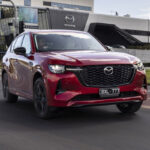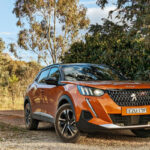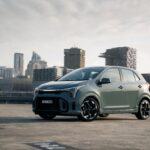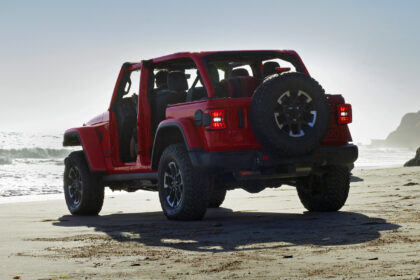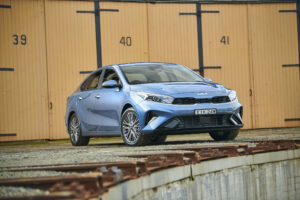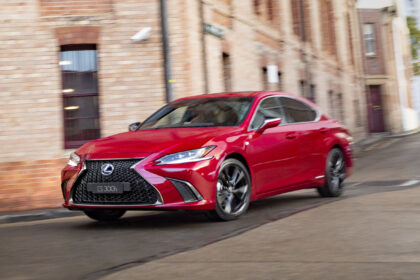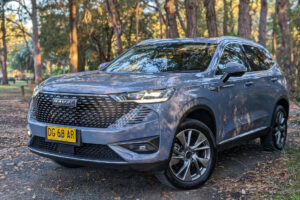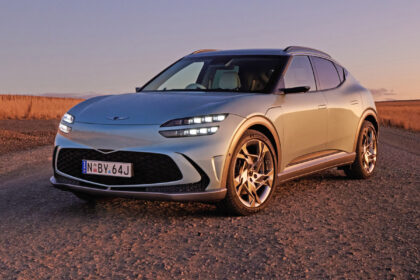
I must be seeing double.
Apart from the difference in size, the Mazda CX-60 and CX-90 could be twins.
They look the same. They share the same chassis, the same engines and transmissions
and their performance is very much the same.
Everything is the same, same, same – or is it?
STYLING
At 5120mm and 2220kg CX-90 is the largest Mazda to date and is available in six- and
seven-seat configuration, with a choice of petrol or diesel engines – both of them hybrids.
That’s 38mm longer than the CX-60 we reviewed recently, 45mm longer than the CX-9,
195mm longer than CX-8 and a whopping 545mm longer than the best-selling CX-5.
Get the picture.
If CX-60 is targeted at the BMW X3, then that means CX-90 has X5 customers in its
sights, and that’s a pretty tall order.
It’s like trying to climb Mt Everest without the right amount of oxygen. Take too little and
you’re not going to make it.
For the time being, CX-90 replaces the CX-9 which is in run-out, priced from just over
$50,000 through to $74,400. Coincidentally the latter figure is the starting point for the CX-
90.
It gets you the hybrid, 3.3-litre Touring entry model, which is followed by the GT at $85,335
and the Azami at $94,435 – all before on-road costs.
You won’t get much change out of $100K for the Azami by the time you add in on-roads.
Add one of the $5000 SP or Takumi option packs and the figure reaches $100,935 – again
before on-roads.
That’s a heck of a lot of folding money for a Mazda, you might be thinking?
So, am I.
Our test vehicle was the seven-seat petrol-powered version of the Azami finished in the
crowd favourite Soul Red.
Mazda says CX-90 offers more luggage capacity than CX-9, but does not offer
comparative figures.
In total, you get 608 litres with three rows in use or 2025 litres with the second and third
row folded.
This is measured to the top of the seat back rather than the roof and includes under-floor
storage.

While CX-90 is all-wheel drive and marketed as an SUV, no one in their right mind is going
to take this car any further off road than a dirt shortcut.
In reality it’s more of a people mover and as such a dedicated MPV would be more
practical.
Standard kit for the Azami includes 21-inch machined alloys, Nappa leather, three-zone
climate air, heated and cooled front seats, power-adjust heated steering wheel, LED
ambient lighting and a panoramic sunroof.
There’s also head-up display, a fully digitised instrument cluster, adaptive LED headlights,
auto high beam, keyless entry and start, auto dimming mirror, auto lights and wipers, plus
front and rear parking sensors.
Not to mention intelligent speed assist, traffic sign recognition and the much-vaunted driver
personalisation system.
CX-60 is covered by a 5-year unlimited kilometre warranty with 5-year roadside
assistance, with service intervals of 15 months/15,000km.
Braked towing capacity is a conservative 2500kg.
It comes in a range of eight colours including the aforementioned Soul Red Crystal Metallic
(but it’s an extra $995).
INFOTAINMENT
Infotainment consists of a large, narrow 12.3-inch screen, but as is the norm with Mazda it
is not a touchscreen and must be operated from a central control knob.
It is frustrating in the extreme that Mazda persists with this approach and irritating that the
car must be in park with the handbrake applied before some features are accessible.
There’s Bluetooth, built-in navigation, AM/FM/DAB+ digital radio, Apple Carplay and
Android Auto (wireless and wired, plus wireless phone charging.
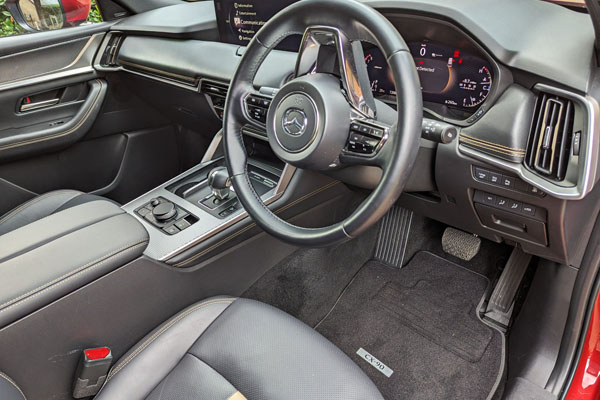
Audio is provided by a 12-speaker Bose audio system.
There’s two USB-C ports for each of the three rows, plus a 12V/120W socket in the front,
150W AC socket in the back, plus another 12V/120W socket in the luggage area.
ENGINES / TRANSMISSIONS
While the 3.3-litre six-cylinder mild hybrid in the CX-60 produces 209kW and 450Nm, the
same engine in CX-90 has been tuned to produce 254kW and 500Nm, the latter over a
wide band from 2000-4500 rpm — no doubt to compensate for the extra weight of the
larger vehicle.
The diesel in comparison produces 187kW and 550Nm between 1500 and 2400 rpm, and
uses 5.4L/100km (and amazingly is cleaner producing 143g versus 189 g/km of CO2).
M Hybrid Boost consists of a 0.33kWh lithium-ion battery, an inverter, a DC-to-DC
converter and an electric motor/generator rated at 12kW and 153Nm integrated into the
transmission.
An eight-speed conventional auto transmits power to the wheels, but with a clutch in place
of a torque converter that is supposed to allow more accurate control of the electric motor –
– but it’s not the smoothest car to drive.
SAFETY
Although it hasn’t been crash tested for safety yet, there’s 10 airbags — front, side and
curtain airbags, as well as a driver knee airbag and centre airbag designed to stop front
seat occupants bumping heads in a side impact.
There’s a 360-degree camera, Smart Brake Support (SBS) with Turn-across traffic and
Blind Spot Monitoring (BSM) with Vehicle Exit Warning.
Autonomous emergency braking (Car-to-Car, Vulnerable Road User and Junction Assist)
as well as a lane support system with lane keep assist (LKA), lane departure warning
(LDW) and emergency lane keeping (ELK), and blind spot monitoring (BSM) are also
standard.
There’s two Isofix and five top tether child seat anchor points.
DRIVING
We got to have a good crack in the CX-90 over the Christmas/New Year period.
Apart from the same quirks as the CX-60, one needs to remember this hybrid is unlikely to
deliver Prius-like levels of fuel consumption.
That’s because it’s based on a larger capacity, six-cylinder engine and an in-line straight
six at that, as favoured by the likes of BMW.
With a 74-litre tank, Mazda claims 8.2L/100km, but bear in mind it takes premium 95
unleaded (it’s E10 compatible).
During this period fuel consumption ranged from a low of 8.6L up to more than
10.0L/100km over almost 1000km of mixed driving.
Around town we’d expect to see about 9.8L/100km which is where it spent most of the
time before making any longer excursions.
The electric motor is designed to support the engine at low loads and low engine speeds,
boosting efficiency over short distances.
The battery is recharged by the engine or via regenerative braking.
If it’s full, any surplus is used to power in-car electrical components.
CX-90 like the CX-60 is all-wheel drive but with a rear wheel bias, which gives it sportier
handling and a tighter turning circle than you might expect.
Torque vectoring has been joined by something Mazda calls Kinematic Posture Control
(Mazda loves acronyms) to control the attitude when braking – a technology also found in
the MX-5.
There’s gear change paddles and four different switchable driving modes, ranging from
Normal, Sport, Off-Road and Towing.
The look of the dash changes with each drive mode but that is the extent of any
customisation, and something of a missed opportunity, we might suggest.
The gear selector is fiddly, there’s a lag when you plant the accelerator and it slumps into
gear from time to time.
The brakes can be abrupt too.
Interestingly, when you back off and the engine is no longer under load, the tacho needle
flat lines as the electric motor takes over.
Once it gets going, acceleration in the CX-90 sounds and feels six cylinder strong.
Belying its size and weight, the dash from 0-100km/h takes 6.9 seconds (same as CX-60).
But it feels big and hefty, and this is confirmed by a frighteningly long profile. You need to
keep this in mind when negotiating car parks and the like, as evidenced by the scuffed
rims of our test vehicle (not us, just saying).
The driver personalisation system is something of a disappointment. It uses facial
recognition technology to store and automatically restore individual settings including the
driver seat position.
The problem is that the system doesn’t recognise you if you forget to take off your glasses
or sunglasses after the initial setup.
Guess you could use three profiles, one with glasses, one with sunglasses and one
without.
The ride quality is harsh at times, but likely to improve with some passengers aboard.
There are air vents for all rows but the aircon in our test vehicle was a major
disappointment.
It seems to cycle down intermittently but generally takes too long to cool down the cabin,
and even at the lowest setting is not very cold.
Toyota wins hands down.
I lost count of the number of times I banged my head on the tailgate.
Try as I might, I couldn’t find a way of adjusting it.
However, the big question and maybe the only one that really matters is does the CX-90
look and feel like the premium product Mazda believes it to be?
It looks pretty good and it’s got that big sexy six, and if you close your eyes, you could
pretend it’s a BMW.
But in reality, it lacks the punch and sporty feel of a Beemer, and in the end . . . well it’s
just a Mazda.
SUMMING UP
Long before the Chinese arrived on the scene, Subaru identified the need to ‘premiumise’
its product. Hamstrung by limited production capacity, it needed to squeeze more profit out
of the cars it built and decided this was the way to do it.
While models like the CX-90 may well be more premium offerings, success depends
largely on whether the market perceives them this way.
Buyers can be notoriously fickle.
Just as Hyundai has done with its luxury Genesis offshoot, it would provide a clear point of
difference if Mazda did the same kind of thing, drawing an unequivocal line between its
previous products and the premium ones it is now offering.
Maybe it’s time to bring back the Eunos nameplate?
RATINGS:
Looks: 7/10
Performance: 7.5/10
Safety: 8/10
Thirst: 7/10
Practicality: 6/10
Comfort: 7.5/10
Tech: 7.5/10
Value: 6/10
Overall: 7.1/10
AT A GLANCE
MODEL RANGE
CX-90 Touring G50e M Hybrid: $74,400
CX-90 Touring D50e M Hybrid: $76,400
CX-90 GT G50e M Hybrid: $85,335
CX-90 GT D50e M Hybrid: $85,400
CX-90 Azami G50e M Hybrid: $94,435
CX-90 Azami D50e M Hybrid: $93,320
CX-90 Azami G50e SP M Hybrid: $100,935
CX-90 Azami D50e SP M Hybrid: $99,820
CX-90 Azami G50e Takumi M Hybrid: $100,935
CX-90 Azami D50e Takumi M Hybrid: $99,820
Note: These prices do not include government or dealer delivery charges. Contact your
local Mazda dealer for drive-away prices.
SPECIFICATIONS: (Mazda CX-90 Azami G50e 3.3L turbo 6-cylinder petrol, 8sp
automatic, AWD SUV)
ENGINE:
Capacity: 3.3 litres
Configuration : Six cylinders inline, mild hybrid
EV: 48V 12.4kW / 153 Nm electric motor; 0.33 kWh lithium battery
Maximum Power: 254 kW @ 5000-6000 rpm
Maximum Torque: 500 Nm @ 2000-4500 rpm
Fuel Type: Premium 95 unleaded (E10 compatible)
Combined Fuel Cycle (ADR 81/02): 8.2 L/100km
CO2 Emissions: 189 g/km
DRIVELINE:
Eight-speed integrated electric motor-generator automatic transmission, all-wheel drive
DIMENSIONS, WEIGHT AND CAPACITIES:
Length: 5120 mm
Wheelbase: 3120 mm
Width: 2157 mm
Height: 1745 mm
Turning Circle: 10.8 m
Kerb Mass: 2220 kg
Fuel Tank Capacity: 74 l
BRAKES:
Front: Ventilated disc
Rear: Ventilated disc
STANDARD WARRANTY:
5 years / unlimited kilometres




